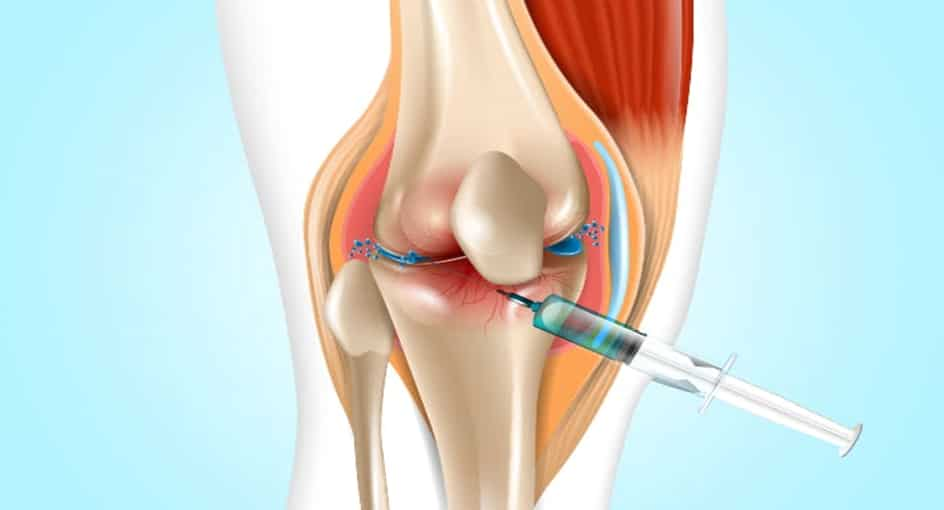However, you don’t have to live on pain pills, and you don’t have to suffer daily. Joint injections have brought much relief to those who have previously suffered from joint pain. Keep reading to learn about how this pain management process can offer long-term pain relief for individuals who have suffered from chronic pain.
HOW DO JOINT INJECTIONS WORK?
Ultimately, joint injections ease pain. Instead of waiting for a painkiller to dissolve in your digestive tract, you can experience nearly instant relief from an injection delivered directly to the site of pain. The injections have a medication that doctors will inject into your joint that is causing you pain. Injections will work in one of two ways. They will deliver a steroid or other pain-relieving medicine into the joint, causing the pain. This medication will reduce inflammation and ultimately numb the pain.
Other injections will create a heat lesion on the nerve that transmits pain. This lesion will block the signal the joint is sending to the brain, thus easing pain. Doctors will also use injections diagnostically to determine the specific location of the pain. For example, a doctor may use the injection to identify the specific disc herniated in the back or the location of a compressed nerve.
TYPES OF JOINT INJECTIONS
In the same way that not all joints work the same, not all joint injections work the same. Each type of injection depends on the reason for your pain and the location of the pain. Here are a few common injection types:
Corticosteroid Injections
Doctors will often prescribe cortisone injections when you have arthritis, bursitis, or osteoarthritis that causes pain in your knees, shoulders, and hips. The steroid will quickly reduce inflammation.
One injection may not provide adequate relief. Sometimes patients will have up to three injections and may get relief from anywhere from 6 months to over a year.
Hyaluronic Acid (viscosupplementations) Injections
When a cortisone shot doesn’t work, doctors may prescribe a hyaluronic acid injection, especially for knee pain. Patients who have no visible inflammation or patients with diabetes are great candidates for an HA injection because it does not raise blood sugar as a cortisone injection does.
PTM or Stem Cell Injections
PTM, or stem cell injections, consists of placental tissue that a mother has donated after she has delivered a healthy baby. The tissue has stem cells which can then multiply and provide pain relief.
PRP Injections
Doctors use platelet-rich plasma injections specifically to treat osteoarthritis joint pain. In short, the plasma uses your platelets and blood as its protein and growth factors. This heals soft tissues.
Nerve Block Injections
A nerve block injection will block the pain signals that are moving from your joint to your brain. Thus, while you still may have the problem in your joint, you won’t feel it because your brain will not register the pain.
Trigger Point Injections
Individuals who suffer from chronic pain illnesses such as fibromyalgia and myofascial pain syndrome may find some relief from trigger point injections. With these chronic issues, muscles tighten into painful knots referred to as trigger points. These trigger points then irritate the nerves in the muscles. The health care professional will inject an anesthetic or saline along with a steroid that makes the trigger point inactive and thus relieves pain.
DO JOINT INJECTIONS WORK?
Joint injections for chronic pain offer significant pain relief for most patients. Many experience long-term relief for many months. Joint injections work especially well for chronic pain in the following joints:
- Feet
- Ankles
- Knees
- Hips
- Elbows
- Shoulders
- Neck
- Back
- Wrists
- Hands
Chronic pain can stem from age or an injury. If you injure a joint or break a bone, you will also typically damage a ligament, muscle, tendon, or nerve. Sometimes you just suffer from overuse injuries, where you use the same joint in the same way repeatedly and thus have chronic pain.
Joint injections are uncomfortable initially. However, the momentary pain of an injection is small compared to the chronic pain that many individuals feel. The injection can lubricate your joints, reduce inflammation, and improve your quality of life.
BEFORE YOUR APPOINTMENT
Before you go to the doctor, prepare for your appointment. Some conditions will disqualify you for joint injections.
Let your doctor know if you have had any of the following conditions:
- Current infections
- Parkinson’s disease
- Cerebral palsy
- Any blood-borne disease
- Any malignancies
- Cancer within the last 5 years
Also, let the doctor know if you’re currently taking Coumadin or any other blood thinners. These conditions may not automatically disqualify you for a joint injection, but they may alter the type of injection you can receive.
SEEK RELIEF WITH JOINT INJECTIONS
The mild pain of an injection for a few seconds does not compare with the chronic pain that individuals suffer from. When your pain is keeping you up at night and affecting your quality of life, it’s time to think about joint injections.
Seek a physician’s expert opinion on what type of injection will work best for your condition. If you’re suffering from chronic joint pain, call us. We’re committed to resolving your pain, and our three pain clinics provide relief for hundreds of customers experiencing acute or chronic pain. We use a variety of minimally invasive techniques to treat the cause of your pain. In particular, we use proven interventions, such as joint injections, to reduce or completely ease pain.
Contact Airport Plaza Spine and Wellness at (732) 264-2233 and let us help you regain your former quality of life.
Pain relief joint injections
